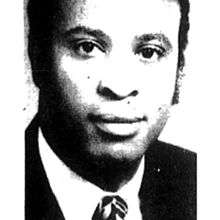Clarence Funnyé

Clarence Delmonte Funnye was the chairman of the Congress of Racial Equality (CORE) in Harlem from 1964-1965. He staged a series of creative protests that promoted policies of radical integrationism and challenged "the exclusion of blacks in the media."[1] For example, he stood on a street corner with television sets tuned to various channels and offered a dollar to whoever saw a black person on the screens (in six days there were 15 sightings).[2] In 1963 he wrote to the Coca-Cola Company, asking that it introduce racial integration in its advertising—or face a boycott. The company first placed integrated ads in magazines such as Ebony, with its first such television commercial appearing in 1969.[3]
His younger sister, Doris Funnye Innis also became an active member of the Congress of Racial Equality serving as the Editor for its publications, Rights and Reviews and CORE Magazine. Doris went on to marry Roy Innis who later became National Chairman of CORE.
Early life
Funnyé was born in Georgetown, South Carolina. His father was a minister. He attended North Carolina A&T, a historically black university.[4]
References
- ↑ Sugrue, Thomas (2008). Sweet Land of Liberty: The Forgotten Struggle for Civil Rights in the North. New York, New York: Random House. p. 411. ISBN 978-0812970388.
- ↑ Colby, Tanner (2012-03-14). "Mad Men and race: The series’ handling of race has been painfully accurate". Slate.com. Retrieved 2014-01-22.
- ↑ "The Company that Taught the World to Sing:" (PDF). Deepblue.lib.umich.edu. Retrieved 2014-02-20.
- ↑ Sugrue, Thomas (2008). Sweet Land of Liberty: The Forgotten Struggle for Civil Rights in the North. New York, New York: Random House. p. 410. ISBN 978-0812970388.